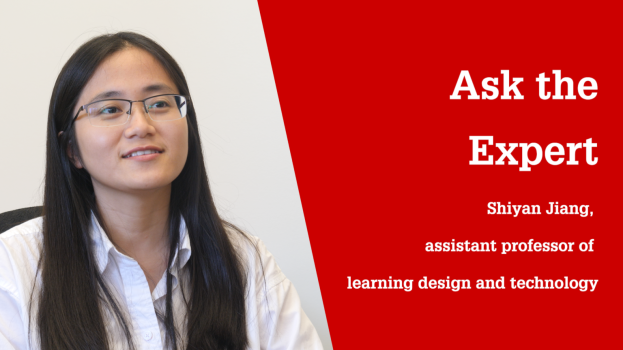Technology like artificial intelligence (AI) may seem mystifying to many, but Shiyan Jiang, an assistant professor of learning design and technology in NC State’s College of Education, believes that learning about the technology can help students develop important skills even if they don’t pursue a STEM profession.
AI is often thought of as a sophisticated, high-level technology. However, Jiang, whose research focuses on broadening access to STEM in areas like artificial intelligence, data science and computing, says it is really very human-oriented.
For example, in the subfield of artificial intelligence known as machine learning, the computer learns patterns from training data collected and generated by humans and then uses these patterns to make predictions based on knowledge gained from the data set.
“Many of us might think that artificial intelligence is a mystery that can make magic happen, but that’s not the case. The process of developing AI is very much about how we humans define what it is,” she said. “I want students who will go out and play with these technologies, from the very beginning, to not see it as magic or a mystery, but see it as a very human-oriented experiences, see the decisions humans need to make, and I want them to even see the biases we might have put into those AI technologies.”
Bringing Diversity into the Field
Biases in AI technology, Jiang said, may not be intentional but can come from a lack of diversity in the field and have negative impacts on those who use the technology.
For example, studies show that facial recognition AI technology on most smartphones works more often and more successfully for white men than it does for people from other racial backgrounds. This is a result of the training data – which contained a disproportionate number of images of white males – that was used to develop the AI model.
“At the beginning, we’re not always aware of these issues when we develop technology that we feel will make our life better but, in the end, we find out that there are some issues because only some people can use the function, not everyone” Jiang said.
Continue reading: https://ced.ncsu.edu/news/2022/07/26/what-is-artificial-intelligence-the-process-of-developing-ai-is-very-much-about-how-we-humans-define-what-it-is-says-assistant-professor-shiyan-jiang/
AI is often thought of as a sophisticated, high-level technology. However, Jiang, whose research focuses on broadening access to STEM in areas like artificial intelligence, data science and computing, says it is really very human-oriented.
For example, in the subfield of artificial intelligence known as machine learning, the computer learns patterns from training data collected and generated by humans and then uses these patterns to make predictions based on knowledge gained from the data set.
“Many of us might think that artificial intelligence is a mystery that can make magic happen, but that’s not the case. The process of developing AI is very much about how we humans define what it is,” she said. “I want students who will go out and play with these technologies, from the very beginning, to not see it as magic or a mystery, but see it as a very human-oriented experiences, see the decisions humans need to make, and I want them to even see the biases we might have put into those AI technologies.”
Bringing Diversity into the Field
Biases in AI technology, Jiang said, may not be intentional but can come from a lack of diversity in the field and have negative impacts on those who use the technology.
For example, studies show that facial recognition AI technology on most smartphones works more often and more successfully for white men than it does for people from other racial backgrounds. This is a result of the training data – which contained a disproportionate number of images of white males – that was used to develop the AI model.
“At the beginning, we’re not always aware of these issues when we develop technology that we feel will make our life better but, in the end, we find out that there are some issues because only some people can use the function, not everyone” Jiang said.
Continue reading: https://ced.ncsu.edu/news/2022/07/26/what-is-artificial-intelligence-the-process-of-developing-ai-is-very-much-about-how-we-humans-define-what-it-is-says-assistant-professor-shiyan-jiang/

